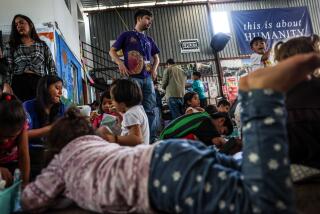Americans Living in Baja Ordered Out by Mexican High Court
The first group of about 200 Americans caught in a dispute over Baja California property are to be removed from their homes within 10 days after the Mexican Supreme Court sternly ordered federal officials to carry out a year-old eviction order.
The evictions would presumably end a 27-year battle that demonstrated the risks in owning Mexican real estate, especially on property designated as ejidos, the communal land grants that have been a Mexican tradition for a century as a way of empowering the poor but which are under continuing legal challenge across the country.
Those complexities are little comfort to Leigh Zaremba, an Orange County transportation consultant who expects to lose his $250,000 home this weekend after 10 years of residence. Houses in the 250-acre peninsula called Punta Banda, about 85 miles south of the U.S.-Mexico border, range in value from $50,000 to $1 million.
“This is a huge betrayal by the Mexican government,” Zaremba said. “The idea that a government agency approved this development, sent us documents that we were here legally, told the U.S. Embassy that they would work to solve this dispute and then turn around and say we are losing our right to everything--well, people here are in shock.”
The original eviction order was handed down in October 1999, but officials failed to carry it out when the Ejido Coronel Esteban Cantu blocked entry to the property. An attempt to broker an agreement between the original landowners and U.S. residents went nowhere.
But the Supreme Court’s edict Monday had teeth in it, stating that the Agrarian Reform Ministry officials who failed to carry out last year’s order are themselves subject to arrest and that current officials would be fired if the evictions aren’t carried out within 10 days.
“I feel happy with the authorities. We never lost confidence in the authorities and we kept fighting until they did their jobs,” said Gerardo Limon, a Mexico City attorney and part owner in Purua Punto Estero.
Original landowners claimed that their land was illegally taken from them in 1973 to create the ejido.
In Mexico City, the Agrarian Reform Ministry issued a statement Tuesday promising to carry out the evictions and deliver the first disputed 40-acre parcel, containing 23 homes and the 100-room Baja Beach and Tennis Club Hotel, to owners Purua Punto Estero. Similar evictions in parts or all of six remaining parcels are expected to follow.
The Punta Banda case has received widespread publicity because of the high number of U.S. property owners in Baja, an estimated 70,000, and the seeming arbitrariness of the evictions. Residents believed they had followed proper procedures in leasing land from the ejido, not knowing that the ejido was embroiled in an ownership dispute.
Many U.S. citizens live full-time on the development as retirees or employees at Mexican factories. Alex Sanchez, a retired banker from Yuma, Ariz., said he and his wife must now contemplate the loss of their only home, about 15 miles south of Ensenada on scenic Todos Santos Bay, and much of their life savings.
“We don’t really know what we’ll do if we lose it,” said Sanchez, who built his house in 1987 on land leased from the Ejido Coronel Esteban Cantu. “We’ve never gotten to the point of wondering about our options because we never thought it would come to this, that we’d be kicked out of the house.”
Residents have tried to negotiate agreements directly with landowners, and a minority are expected to cut deals to stay. But other landowners have said they want to redevelop their property.
Residents who had harbored hopes of receiving some remuneration from the landowners now see that as a remote prospect, since the landowners have prevailed legally.
Federal officials are expected to show up with trucks to remove and to impound, if necessary, residents’ furniture. The residents’ options appeared to be exhausted. Tijuana attorney Dennis Peyton, who represents several of the owners, did not return telephone calls Tuesday.
Ejido treasurer Guadalupe Martinez said “it’s very probable” that the ejido will resist the eviction move as it did last year. “The attorneys are talking now and we haven’t received any formal notification. It’s very quiet, everything is normal now.”
As recently as last month, U.S. Embassy officials in Mexico City held meetings between rival attorneys to try to work out a solution. But an embassy spokeswoman couldn’t offer any substance from the meeting.
“Of course we’ve been following this for months. We are in touch with American citizens there. At this point we don’t have any comment because this is an ongoing legal proceeding,” said the spokeswoman, who asked that her name not be used.
Adding to the confusion at Punta Banda on Tuesday was that residents don’t know which houses in the development are designated for eviction. Only 23 houses were specified in the Supreme Court’s order Monday, but there are probably twice that many in the development, and all were originally slated for eviction. Residents assume that nearly all will be removed.
The Agrarian Reform Ministry said in its statement Tuesday that of the 5,200 legal disputes involving ejidos, only 248 remain unresolved in the Mexican courts.
More to Read
Sign up for Essential California
The most important California stories and recommendations in your inbox every morning.
You may occasionally receive promotional content from the Los Angeles Times.










